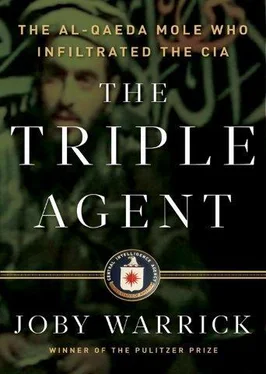Others, including several of the heavily armed men in charge of keeping the CIA officers safe, had similar misgivings. During the practice run, security chief Scott Roberson and Matthews clashed sharply in an incident later described to CIA investigators.
Roberson, though also new to the base, had spent much of the decade protecting top U.S. government officials in Baghdad, honing his instincts during the worst years, when insurgents were staging hundreds of attacks a day. On the day of the rehearsal, several officers witnessed Roberson and Matthews stepping away from the group for a heated argument conducted in hushed tones. Afterward, witnesses said, Roberson walked to where security guard Dane Paresi was standing and shrugged. Whatever the nature of the dispute, it seemed to those watching to be settled.
Around this time, Paresi, the former Green Beret, complained to colleagues at Blackwater about the security arrangements. And ex-SEAL Jeremy Wise, just two weeks into his assignment at Khost, e-mailed a SEAL friend on December 21 hinting that he had had differences with the agency’s civilian managers in the lead-up to an important operation. “Sometimes it’s your job to say something—‘Sir, I don’t think you should do that. It’s not a good idea,’ ” he wrote.
After days of such conflict, LaBonte finally decided to appeal to his CIA supervisors in Jordan. He sat down to type out an e-mail to the Amman station chief, copying several of the station’s other managers, warning that the Balawi case was in danger of veering off the rails.
There are three problems , he wrote, according to an officer who read the note. Then he listed them.
There are too many people involved .
We’re moving too quickly .
We’re giving up too much control by letting Balawi dictate events .
The e-mail created a stir in Amman. The station chief read the contents carefully, but decided not to intervene. The case was too important and must proceed, he told colleagues.
Whether CIA managers in Langley saw the note before Balawi’s arrival is unclear. It was never forwarded to Matthews, who in any case knew LaBonte’s concerns by heart.
Later, as final arrangements for Balawi’s visit were being made, Khost’s security chief offered a word of advice to a colleague who was planning to go to the meeting to see the informant who had generated such excitement.
Roberson cautioned the officer, Stay far away from this .
The passing of Christmas only deepened the misery bin Zeid and LaBonte were feeling. When they arrived at Khost, the two Amman officers had planned on a short visit and a quick meeting, but now they were in their third week on the base with little to do and no Balawi in sight.
LaBonte’s efforts to alter the arrangements for the meeting had failed. Matthews was in charge at Khost, and both Kabul and Langley were solidly behind her. There had been small concessions on security. Matthews agreed that Balawi would be searched immediately when he entered the CIA’s inner sanctum inside the base, while the other officers stood a respectful fifty feet away. But there was to be no compromise on the meeting’s location and no retreat from the view that a debriefing of such importance demanded a large and diverse team. LaBonte was beginning to wonder if it mattered: Balawi was still insisting on a meeting in Pakistan that everyone knew would never happen. There was now a real chance that the meeting would be scrubbed, and the entire mission deemed a failure.
Adding to the gloom, both men were feeling homesick. LaBonte was already a week late to join his family at the Tuscan vacation home he had personally picked out over the Internet. Instead he was sleeping on a cot in a smelly guesthouse with strange men. Bin Zeid, meanwhile, was going stir-crazy from weeks of close confinement. Fearing that a Jordanian royal would make an all-too-tempting target for any Afghan soldiers who might be secret Taliban sympathizers, the CIA had restricted him to a small area of the base.
Bin Zeid had given the CIA officers a rare moment of levity when he nearly burned down one of the compound’s bathhouses. A confirmed germophobe, he had tried to sterilize a toilet by dousing the seat with a chemical cleaner. When he lit a match, the small fireball that erupted nearly singed his eyebrows.
Others on the base sought to extract whatever small bits of pleasure they could salvage from the occasion of Christmas. There were toasts in the CIA’s lounge, one of the rare places to buy a beer in the otherwise bone-dry constellation of U.S.-run installations in Afghanistan. Care packages of Christmas cookies and cakes were opened and shared. Wise, the former Navy SEAL and Blackwater guard, showed off an illustrated Christmas list his young son Ethan had colored and sent by e-mail.
Three days later the last of the Christmas treats had been eaten, and all expectations for a meeting with Balawi had dried up. LaBonte used bin Zeid’s cell phone to share the news with his wife: The business in Afghanistan was over, and he would be on his way to Italy as soon as he could book the flight.
The announcement quickly proved premature. Within hours of the call, bin Zeid finally received the e-mail with the news everyone had been waiting for. Humam al-Balawi had agreed to come to Khost after all. He would be at the base the next day.
LaBonte decided against calling his family again. He didn’t want to disappoint them, and besides, Balawi’s change of heart meant only a slight delay in his departure. He could still be in Italy by New Year’s Eve.
Balawi’s imminent arrival also meant that Elizabeth Hanson would soon be on her way back to Kabul. She called her mother in Rockford, Illinois, to tell her so.
Hanson always tried to sound upbeat in conversations with her mom to keep her from worrying. She had told her mother that an important meeting was coming up but said little else about it.
But on this evening, with Balawi at last on his way, Hanson was not her usual breezy self. She ended the conversation with words her mother had not heard her utter since childhood. “Pray for me,” Hanson said. “Just say a prayer that it goes well.”
Datta Khel, North Waziristan—December 2009
The Pashtun tribesman known as al-Qaeda’s tailor lived in a house near the village of Datta Khel in North Waziristan, where he made a living making suicide vests. One morning in mid-December he sat at his antique sewing machine to fill yet another order, this one very different from the vests he usually made.
The man was celebrated for his ingeniously simple designs that were both reliable and cheap, two key selling points for a terrorist organization that waged suicide bombings on an industrial scale. He started with a sturdy cotton vest, often surplus military gear from the local bazaar, and attached thick straps so it could be secured snugly against the torso. He added fabric pouches and stuffed them with packets of white acetone peroxide powder, an explosive popular in Pakistan’s tribal region because it can be cooked up at home using common ingredients. Next came the shrapnel layer, which consisted of hundreds of nails or other bits of metal glued to sheets of thick, adhesive-backed paper or cloth. Finally, he inserted blasting caps in the powder and attached them to wires that ran to a small nine-volt battery and a cheap detonator switch. The latter item he sewed into a separate pouch that closed with a zipper. That, he explained, was to prevent excitable young martyrs-to-be from blowing themselves up too quickly. An extra second or two of fumbling with the zipper would remind the bomber to move in closer to his target to ensure the maximum possible carnage.
Читать дальше












